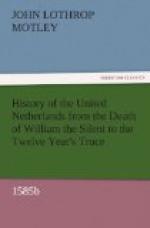There were few more brilliant characters than he in all Christendom. He was a man, of a most rare and versatile genius. Educated in Geneva at the very feet of Calvin, he had drunk, like mother’s milk, the strong and bitter waters of the stern reformer’s, creed; but he had in after life attempted, although hardly with success, to lift himself to the height of a general religious toleration. He had also been trained in the severe and thorough literary culture which characterised that rigid school. He was a scholar, ripe and rare; no holiday trifler in the gardens of learning. He spoke and wrote Latin like his native tongue. He could compose poignant Greek epigrams. He was so familiar with Hebrew, that he had rendered the Psalms of David out of the original into flowing Flemish verse, for the use of the reformed churches. That he possessed the modern tongues of civilized Europe, Spanish, Italian, French, and German, was a matter of course. He was a profound jurisconsult, capable of holding debate against all competitors upon any point of theory or practice of law, civil, municipal, international. He was a learned theologian, and had often proved himself a match for the doctors, bishops, or rabbin of Europe, in highest argument of dogma, creed, or tradition. He was a practised diplomatist, constantly employed in delicate and difficult negotiations by William the Silent, who ever admired his genius, cherished his friendship, and relied upon his character. He was an eloquent orator, whose memorable harangue, beyond all his other efforts, at the diet of Worms, had made the German princes hang their heads with shame, when, taking a broad and philosophical view of the Netherland matter, he had shown that it was the great question of Europe; that Nether Germany was all Germany; that Protestantism could not be unravelled into shreds; that there was but one cause in Christendom— that of absolutism against national liberty, Papacy against the reform; and that the seventeen Provinces were to be assisted in building themselves into an eternal barrier against Spain, or that the “burning mark of shame would be branded upon the forehead of Germany;” that the war, in short, was to be met by her on the threshold; or else that it would come to seek her at home—a prophecy which the horrible Thirty Years’ War was in after time most signally to verify.
He was a poet of vigour and originality, for he had accomplished what has been achieved by few; he had composed a national hymn, whose strophes, as soon as heard, struck a chord in every Netherland heart, and for three centuries long have rung like a clarion wherever the Netherland tongue is spoken. “Wilhelmus van Nassouwe,” regarded simply as a literary composition, has many of the qualities which an ode demands; an electrical touch upon the sentiments, a throb of patriotism, sympathetic tenderness, a dash of indignation, with rhythmical harmony and graceful expression; and thus it has rung from millions of lips, from generation to generation.




